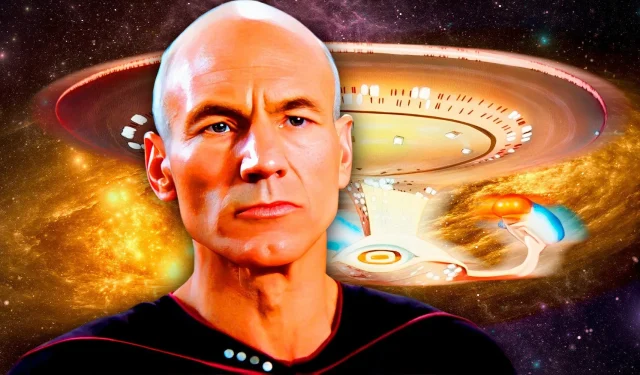
Warning: contains spoilers for Star Trek: Lower Decks #2!
Captain Picard’s Character Evolution: A Look Back
Star Trek has humorously addressed one of Captain Jean-Luc Picard’s notorious personality traits, and it’s about time. Although Captain Picard, played by the talented Patrick Stewart, is celebrated as one of Starfleet’s finest, his early portrayal in Star Trek: The Next Generation presents an altogether different character—one that was notably less pleasant. This inconsistency is humorously highlighted in the latest episode of Star Trek: Lower Decks.
Lower Deckers and the Excalibans’ Holographic Challenge
In an intriguing plot twist, the Lower Deckers find themselves abducted by the Excalibans, who compel Boimler and his teammates to engage in battles against holographic versions of prominent Starfleet figures to unpack the complexities of human nature. Among them, they encounter a holographically-generated Captain Picard, shaped from Boimler’s subconscious. The Excalibans make it clear that Boimler envisioned a “super-hard-ass Picard,” newly-commanded and unnecessarily harsh—a stark contrast to the beloved character fans know today.
Captain Picard: A Different Leader in Early TNG
Since its debut 37 years ago, Star Trek: The Next Generation has cemented Captain Picard as a cultural icon, thanks to Stewart’s nuanced performance. Gene Roddenberry aimed to craft a captain who was a cerebral foil to the brash Kirk. Picard’s character depth shone through his appreciation of classic literature and Earl Grey tea, traits that endeared him to audiences and ensured the series’ success.
Picard’s Stark Demeanor in Season One
However, during the initial episodes of the series, Picard’s demeanor revealed a more standoffish disposition. He kept a notable distance from his crew, unlike Kirk’s more personable captaincy. His directive style and noticeable impatience were apparent, and the early interactions were often marked by harshness that would strike contemporary viewers as surprising.
From Aloofness to Empathy: Picard’s Journey
Confronting Personal Issues and Learning Compassion
Central to Picard’s aloofness was his complicated rapport with children. In the pilot episode, he expresses his discomfort with young Wesley Crusher, displaying a cold indifference that starkly contrasts with the compassionate demeanor he would later embrace. It’s suggested that Picard’s role as a captain, especially in the absence of a family, contributed to his emotional barriers.
Interestingly, Picard’s gradual character development reflects the natural evolution between actor and writer as they navigated the intricacies of his persona. By the end of Season One, the once-stern captain had transformed into a more approachable figure, enhancing the character’s relatability.
The shift in Picard’s attitude towards children also evolved significantly. Over time, Wesley transitioned from a source of exasperation to a valued member of the crew, prompting Picard to reassess his views. This transformation culminated in the episode “Disaster,” where circumstances forced Picard to collaborate with a group of children, significantly softening his outlook.
Remembering Picard’s Early Complexity
The Legacy of Picard’s Early Traits
In today’s narrative, Captain Picard epitomizes trust and analytical leadership—qualities that overshadow his earlier, more surly disposition. This transformation might not be frequently addressed among fans, primarily due to how swiftly this phase was integrated into the history of his character. With Star Trek: Lower Decks diving into lesser-known aspects of the franchise, it aptly revisits this intriguing phase in Picard’s character development.
Star Trek: Lower Decks #2 is currently available for purchase from IDW Publishing!




Leave a Reply ▼